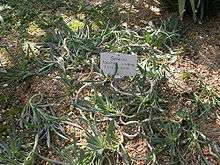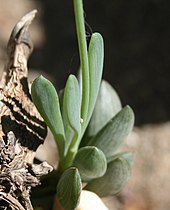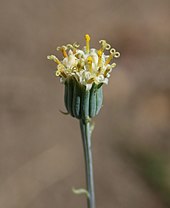Curio archeri
Curio archeri, syn. Senecio toxotis is a species of succulent plant in daisy family that is indigenous to the south-western Cape, South Africa.[3]
| Curio archeri | |
|---|---|
 | |
| Scientific classification | |
| Kingdom: | Plantae |
| Clade: | Tracheophytes |
| Clade: | Angiosperms |
| Clade: | Eudicots |
| Clade: | Asterids |
| Order: | Asterales |
| Family: | Asteraceae |
| Genus: | Curio |
| Species: | C. archeri |
| Binomial name | |
| Curio archeri C.Jeffrey (1992) | |
| Synonyms | |
| |
Description

A small, low-growing succulent, with rhizomes and a few short, erect stems, with the leaves concentrated at the tip of top of each stem. The leaves are blue-green, pruinose, and typically flattened laterally. Each side of the leaf blade has several translucent lines.

The flower capitulum has no ray florets, and appears at the tip of a slender, erect inflorescence.[4]
Distribution
This species is indigenous to the south-western parts of the Western Cape Province, South Africa. It occurs in rocky areas, in the western Little Karoo, in the Robertson Karoo, and in the Overberg region.
It is closely related to Curio citriformis, which occurs in the Little Karoo to the north, as well as to Curio crassulifolius and Curio repens (syn. Senecio serpens).
References
- "Senecio toxotis". International Plant Names Index (IPNI). Royal Botanic Gardens, Kew. Retrieved 2008-05-29.
- "Senecio toxotis record n° 98486". African Plants Database. South African National Biodiversity Institute, the Conservatoire et Jardin botaniques de la Ville de Genève and Tela Botanica. Retrieved 2008-05-29.
- Species Details : Curio archeri (Compton) P.V.Heath Catalogue of Life: 2020-04-16 Beta
- G.Rowley (1994). Succulent Compositae: A Grower's Guide to the Succulent Species of Senecio & Othonna. Strawberry Press. ISBN 0912647124, 9780912647128
External links
| Wikimedia Commons has media related to Kleinia archeri. |
![]()
- Jeffrey, Charles (1992). "The Tribe Senecioneae (Compositae) in the Mascarene Islands with an Annotated World Check-List of the Genera of the Tribe: Notes on Compositae: VI". Kew Bulletin. Royal Botanic Gardens, Kew. 47 (1): 49–109. doi:10.2307/4110768. JSTOR 4110768.